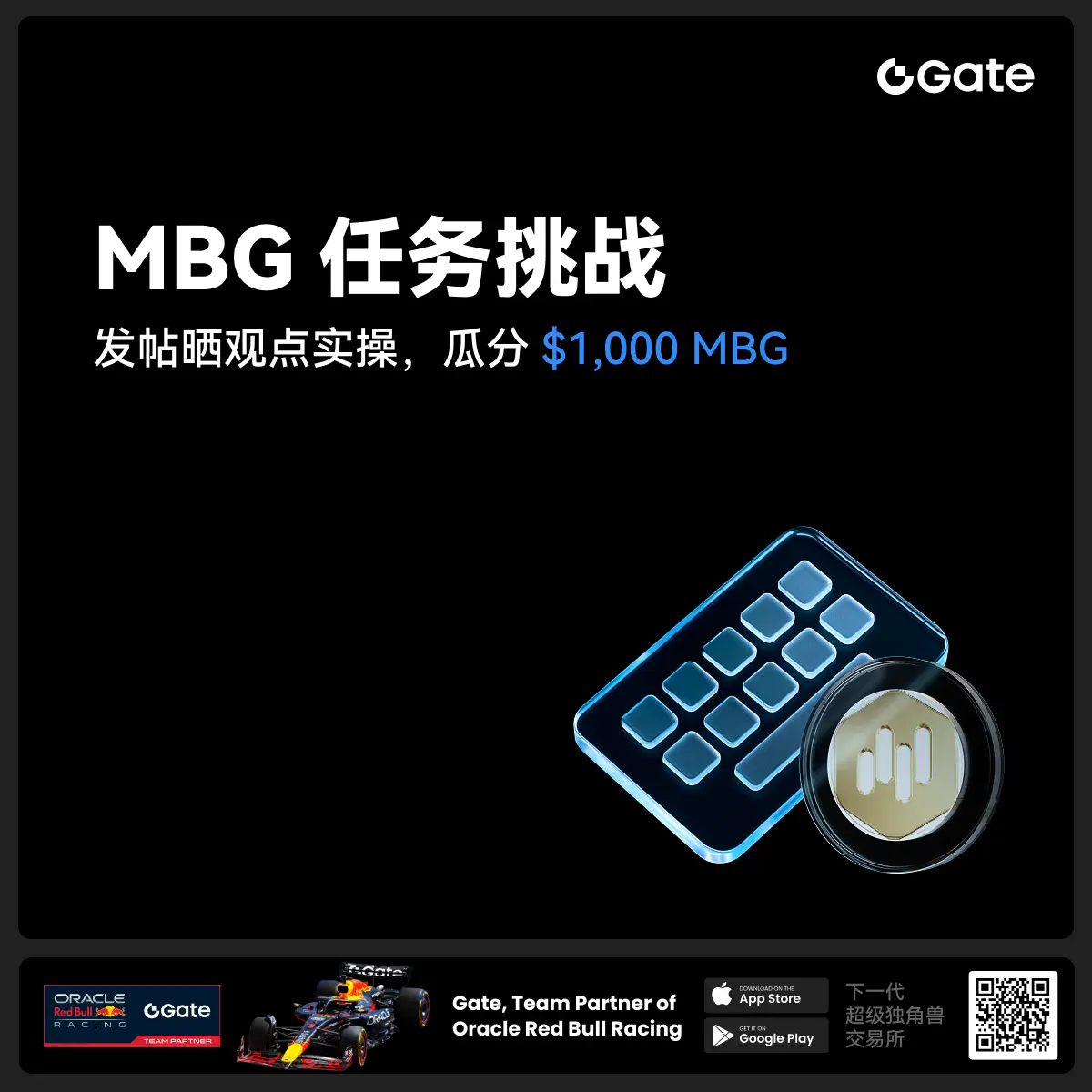- 話題1/3
10k 熱度
20k 熱度
15k 熱度
51k 熱度
22k 熱度
- 置頂
- 📢 Gate廣場 #MBG任务挑战# 發帖贏大獎活動火熱開啓!
想要瓜分1,000枚MBG?現在就來參與,展示你的洞察與實操,成爲MBG推廣達人!
💰️ 本期將評選出20位優質發帖用戶,每人可輕鬆獲得50枚MBG!
如何參與:
1️⃣ 調研MBG項目
對MBG的基本面、社區治理、發展目標、代幣經濟模型等方面進行研究,分享你對項目的深度研究。
2️⃣ 參與並分享真實體驗
參與MBG相關活動(包括CandyDrop、Launchpool或現貨交易),並曬出你的參與截圖、收益圖或實用教程。可以是收益展示、簡明易懂的新手攻略、小竅門,也可以是現貨行情點位分析,內容詳實優先。
3️⃣ 鼓勵帶新互動
如果你的帖子吸引到他人參與活動,或者有好友評論“已參與/已交易”,將大幅提升你的獲獎概率!
MBG熱門活動(帖文需附下列活動連結):
Gate第287期Launchpool:MBG — 質押ETH、MBG即可免費瓜分112,500 MBG,每小時領取獎勵!參與攻略見公告:https://www.gate.com/announcements/article/46230
Gate CandyDrop第55期:CandyDrop x MBG — 通過首次交易、交易MBG、邀請好友註冊交易即可分187,500 MBG!參與攻略見公告:https://www.gate.com/announcements
- 🎉 Gate廣場“星火計劃”入駐KOL突破1000人!
💥 創作者生態迎來全面爆發期!
📈 上首頁、拿獎勵、贏影響力,你還在等什麼?
💰 現金激勵 ✔️
🚀 流量扶持 ✔️
👑 專屬認證 ✔️
從0到1000,我們只用了短短數周,Gate廣場正在成爲Web3內容風暴眼⚡
你發布的不只是內容,而是下一個“爆款機會”!
🌟 加入星火計劃,開啓你的爆發之路!
👉 https://www.gate.com/announcements/article/45695
#GateSquare # #星火计划# #内容创作者新纪元 # #KOL集结令#
- 📢 #Gate广场征文活动第三期# 正式啓動!
🎮 本期聚焦:Yooldo Games (ESPORTS)
✍️ 分享獨特見解 + 參與互動推廣,若同步參與 Gate 第 286 期 Launchpool、CandyDrop 或 Alpha 活動,即可獲得任意獎勵資格!
💡 內容創作 + 空投參與 = 雙重加分,大獎候選人就是你!
💰總獎池:4,464 枚 $ESPORTS
🏆 一等獎(1名):964 枚
🥈 二等獎(5名):每人 400 枚
🥉 三等獎(10名):每人 150 枚
🚀 參與方式:
在 Gate廣場發布不少於 300 字的原創文章
添加標籤: #Gate广场征文活动第三期#
每篇文章需 ≥3 個互動(點讚 / 評論 / 轉發)
發布參與 Launchpool / CandyDrop / Alpha 任一活動的截圖,作爲獲獎資格憑證
同步轉發至 X(推特)可增加獲獎概率,標籤:#GateSquare 👉 https://www.gate.com/questionnaire/6907
🎯 雙倍獎勵機會:參與第 286 期 Launchpool!
質押 BTC 或 ESPORTS,瓜分 803,571 枚 $ESPORTS,每小時發放
時間:7 月 21 日 20:00 – 7 月 25 日 20:00(UTC+8)
🧠 寫作方向建議:
Yooldo
- 🎉Gate 2025 上半年社區盛典:內容達人評選投票火熱進行中 🎉
🏆 誰將成爲前十位 #Gate广场# 內容達人?
投票現已開啓,選出你的心頭好
🎁贏取 iPhone 16 Pro Max、限量週邊等好禮!
📅投票截止:8 月 15 日 10:00(UTC+8)
立即投票: https://www.gate.com/activities/community-vote
活動詳情: https://www.gate.com/announcements/article/45974
- 📢 #Gate广场征文活动第二期# 正式啓動!
分享你對 $ERA 項目的獨特觀點,推廣ERA上線活動, 700 $ERA 等你來贏!
💰 獎勵:
一等獎(1名): 100枚 $ERA
二等獎(5名): 每人 60 枚 $ERA
三等獎(10名): 每人 30 枚 $ERA
👉 參與方式:
1.在 Gate廣場發布你對 ERA 項目的獨到見解貼文
2.在貼文中添加標籤: #Gate广场征文活动第二期# ,貼文字數不低於300字
3.將你的文章或觀點同步到X,加上標籤:Gate Square 和 ERA
4.徵文內容涵蓋但不限於以下創作方向:
ERA 項目亮點:作爲區塊鏈基礎設施公司,ERA 擁有哪些核心優勢?
ERA 代幣經濟模型:如何保障代幣的長期價值及生態可持續發展?
參與並推廣 Gate x Caldera (ERA) 生態周活動。點擊查看活動詳情:https://www.gate.com/announcements/article/46169。
歡迎圍繞上述主題,或從其他獨特視角提出您的見解與建議。
⚠️ 活動要求:
原創內容,至少 300 字, 重復或抄襲內容將被淘汰。
不得使用 #Gate广场征文活动第二期# 和 #ERA# 以外的任何標籤。
每篇文章必須獲得 至少3個互動,否則無法獲得獎勵
鼓勵圖文並茂、深度分析,觀點獨到。
⏰ 活動時間:2025年7月20日 17
零知識機器學習(zkML) : 在人工智能時代,隱私與科技並存
在這個科技發達的時代,ChatGPT 和Midjourney 等生成式人工智能的問世,為設計與藝術、軟件開發、出版甚至金融等領域開啟了全新的可能性。生成式人工智能猶如一場奇蹟,它向我們承諾突破人類創造力的邊界,極大地提升了我們的生產力,引領我們踏上更高層次的創新之路。
為了將ChatGPT 和Midjourney 等軟件發展到今天的水平,需要經過多年的研究和大量數據的訓練,才能培養出這些軟件背後的人工智能模型。以ChatGPT為例,它需要用來自網頁、圖書和其他來源的約570GB數據集進行訓練。其中的一部分數據可能來自於用戶,而這些用戶可能完全不知道他們的個人數據被用於訓練人工智能軟件。儘管大部分收集和使用的數據對用戶本身可能是無害的,但一些敏感或私人數據不可避免地可能混入其中,並被饋送給模型,而用戶並沒有給予同意。
鑑於這樣的系統引發了隱私問題,人們對數據隱私和安全問題的意識和重視不斷增長。有人呼籲在利用人工智能的優勢和保護個人隱私權之間尋找一種和諧的平衡點。幸運的是,有一項有希望的技術可以幫助彌合這一鴻溝——零**知識證明(ZKP)。 **
什麼是 zkML****? ****
零知识协议是一种方法,通过这种方法,一方(证明者)可以向另一方(验证者)证明某个命题为真,而除了这个特定命题为真的事实外,不会透露任何其他信息。自2022年以来,零知识(ZK)技术稳步发展,并在区块链领域取得了显著增长。ZK 领域内的项目一直在不断努力并在可扩展性和隐私保护领域取得了重大进展。
****機器學習是人工智能的一個分支,專注於開發能夠從過去的數據中學習、識別模式並做出邏輯決策的系統,減少對人類的重要參與。它是一種數據分析技術,通過利用各種類型的數字信息,如數值數據、文本內容、用戶交互和視覺數據,自動創建分析模型。 ****
****在監督式機器學習中,我們向預先訓練並具備預設參數的模型提供輸入,而模型則產生可供其他系統使用的輸出。然而,我們必須強調維護輸入數據和模型參數的機密性和隱私的重要性。輸入數據可能包含著敏感的個人財務或生物特徵信息,而模型參數中可能涉及機密的生物特徵認證參數等敏感元素。 ****
****將零知識技術與人工智能相融合,便催生了零知識機器學習(zkML),一項倫理性強且威力巨大的新技術,有望徹底顛覆我們的工作方式。 ****
Modulus Labs 團隊最近發表的名為《 The Cost of Intelligence 》 的論文中,他們通過使用各種規模不同的模型集合,對各種現有的零知識證明系統進行了全面的基準測試。目前,在鏈上機器學習領域,ZK的主要應用是驗證準確的計算。然而,隨著時間和發展的進一步,尤其是簡潔非交互式知識論證(SNARKs),ZKP ****有望發展到一種程度,能夠通過阻止輸入的披露,確保用戶的隱私免受過於好奇的驗證者的侵犯。 ****
zkML本質上是將ZK技術融入AI軟件中,以克服其在隱私保護、數據真實性驗證等方面的局限性。
zkML 的用例
尽管 zkML 仍然是一项新兴技术,但已经引起了广泛关注,同时也具备许多令人瞩目的应用场景。其中一些显著的 zkML 应用包括:
探索zkML 的項目概覽
zkML 的許多應用正在實驗階段,經常在創新的新項目的黑客松中出現。 zkML 為設計智能合約開闢了新的途徑,目前有幾個正在積極探索其應用的項目。
圖片來源@bastian_wetzel
結論
就像ChatGPT 和Midjourney 經歷了無數次迭代才達到今天的狀態一樣,zkML 仍在不斷改進和優化中,經歷了一次又一次的迭代來克服從技術到實際方面的各種挑戰:
在zkML 領域,進展正在以加快的速度進行,有望在不久的將來達到與更廣泛的機器學習領域相媲美的水平,特別是隨著硬件加速技術的不斷發展。
將ZKPs 納入人工智能係統可以為用戶和利用這些系統的組織提供更高級別的安全和隱私保護。因此,我們熱切期待在zkML 領域的進一步產品創新,其中ZKPs 和區塊鏈技術的結合為Web3 無權限世界中的人工智能/機器學習操作創造了安全可靠的環境。